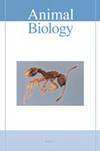肠道菌群是否调节鹅的孵蛋?
IF 0.9
4区 生物学
Q2 ZOOLOGY
引用次数: 0
摘要
家鹅在孵化时可以减少食物的摄入量。由于食物摄入的减少,肠道中的微生物总数也减少了。这会影响鹅的思维,让鹅停止沉思,吃东西吗?我们假设肠道微生物群通过脑肠肽影响大脑,并进一步调节鹅的繁殖行为。在这项研究中,我们评估了与鹅相关的微生物组,以及孵化和产卵期的转录组。分析了不同繁殖期雌鹅肠道微生物群和基因表达的变化和差异,探讨了它们之间可能的相互作用。结果表明,产蛋组盲肠中具有促生长作用的粪杆菌的相对丰度高于育蛋组。两组之间存在显著差异的微生物代谢途径也在具有不同肠道微生物群代谢的次级功能组中富集。产蛋组下调的基因主要与能量代谢有关,如ATP合成相关基因。这些结果表明,孵化组的肠道微生物群可以根据鹅的繁殖阶段做出相关的改变。由于摄入的食物量减少,它可以促进宿主脂肪的分解。同时,胰岛素也被用来向大脑传递信息;有必要在适当的时候结束沉思行为,开始进食。本文章由计算机程序翻译,如有差异,请以英文原文为准。
Does gut microbiota regulate brooding in geese?
Domestic geese can reduce the amount of food intake when brooding. Because of the reduction in food intake, the total number of microorganisms in the gut is also reduced. Will this affect the goose’s thinking and make the goose stop brooding and eat food? We hypothesize that gut microbiota affects the brain through a brain–gut peptide and further regulates the breeding behavior of geese. In this study, we evaluated the microbiome related to the goose and transcription groups of brooding and egg production periods. The changes and differences in gut microbiota and gene expression of female geese in different reproduction periods were analyzed, and the possible interaction between them was explored. The results showed that the relative abundance of Faecalibacterium with a growth-promoting effect in the cecum was higher in the egg production group than in the brooding group. Microbial metabolic pathways with significant differences between the two groups were also enriched in the secondary functional groups with different gut microbiota metabolism. The downregulated genes in the egg production group were mainly related to energy metabolism, such as ATP synthesis-related genes. These results suggest that the brooding group’s gut microbiota can make relevant changes according to the reproduction stage of the goose. Since the amount of food taken in is reduced, it can promote the decomposition of the host’s fat. Simultaneously, insulin is also used to deliver messages to the brain; it is necessary to end the brooding behavior at an appropriate time and for eating to start.
求助全文
通过发布文献求助,成功后即可免费获取论文全文。
去求助
来源期刊

Animal Biology
生物-动物学
CiteScore
2.10
自引率
0.00%
发文量
34
审稿时长
3 months
期刊介绍:
Animal Biology publishes high quality papers and focuses on integration of the various disciplines within the broad field of zoology. These disciplines include behaviour, developmental biology, ecology, endocrinology, evolutionary biology, genomics, morphology, neurobiology, physiology, systematics and theoretical biology. Purely descriptive papers will not be considered for publication.
Animal Biology is the official journal of the Royal Dutch Zoological Society since its foundation in 1872. The journal was initially called Archives Néerlandaises de Zoologie, which was changed in 1952 to Netherlands Journal of Zoology, the current name was established in 2003.
 求助内容:
求助内容: 应助结果提醒方式:
应助结果提醒方式:


